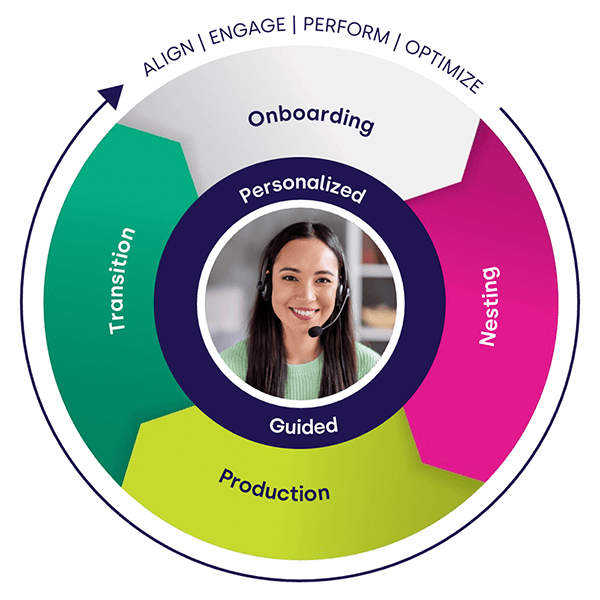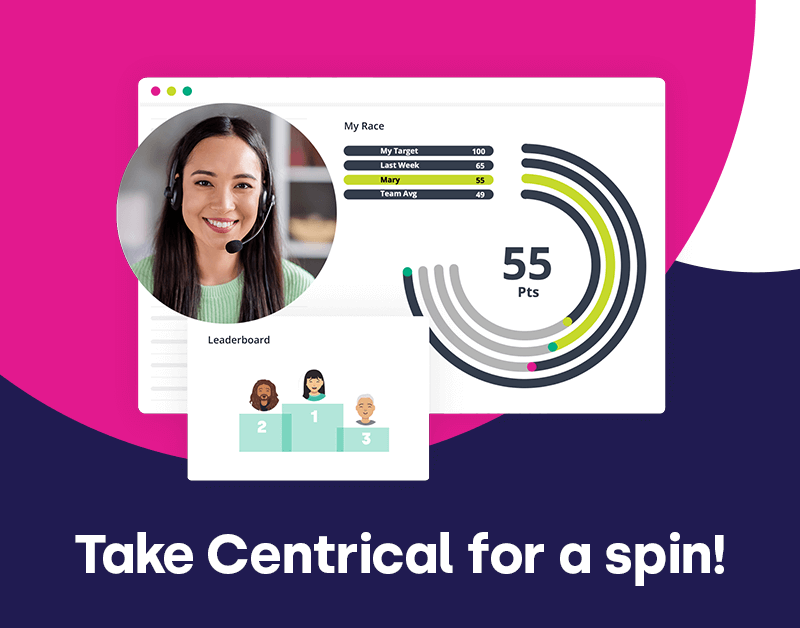This article is the third installment of a five-part series where we discuss Centrical’s Employee Performance Experience (PX) Methodology, and how it drives operational excellence across all stages of the frontline employee lifecycle. In this installment, we will continue the conversation and explain how the four PX Methodology strategies can be applied to the production phase. (In case you missed them, we invite you to review previous installments, where we focused on pre-boarding and onboarding, and the nesting stage.)
For an in-depth look at this methodology and how to put it into practice in your own organization, download our definitive guide.
Production is recognized as the third stage of the employee journey. Employees in the production stage are more productive than the newly onboarded and nesting employees, making their retention critical. Employees in this stage have the knowledge and skillsets that are essential for the organization’s service, quality, cost, revenue, and satisfaction goals. The PX strategies listed below can keep production-stage employees aligned, engaged, and high-performing to help meet and exceed business goals.

Seamlessly align (and realign)
Business requirements (and employee goals) are going to shift. This can be due to any number of factors, such as changing business priorities, market conditions, and disruptive technology. Therefore, organizations must periodically realign employees and adjust their goals to keep them in sync with current business objectives. Examples can include focusing on sales teams selling specific product lines, or customer service agents upselling. Providing visible goals and clear communication around any changes helps employees adapt to a fluid business environment.
Engagement = Retention
Meeting business goals and delivering the best possible customer experience starts with the culture, and creating a culture that truly sustains engagement, especially for remote or hybrid employees, is critical. The culture should include collaborative opportunities, such as knowledge sharing and team communication, to foster connection and drive long-term, optimal engagement and performance. The world’s most admired companies understand this and prioritize investments in culture to engage and retain their employees and build customer loyalty.
Here are a few effective engagement strategies:
Provide ongoing learning and development opportunities and clear career pathways
Today’s frontline workers are seeking career opportunities and growth. By providing ongoing learning and development, clear career pathways, and enabling upskilling, cross-skilling, and re-skilling, your organization will greatly reduce attrition while increasing employee lifetime value by supporting long-term success and growth. This investment will help ensure employees are prepared for today’s workplace challenges while developing a strong bench of high-potential employees ready for tomorrow.
Cultivate strong employee and manager relationships.
Enable frontline managers to easily identify opportunities for improvement. Reduce the effort required of managers when preparing for coaching conversations, to provide more time for them to provide direct support and empathetic coaching. This leads to more meaningful, actionable conversations and stronger relationships, which can significantly impact employee engagement, performance, and improving overall cost efficiencies.
Perform consistently.
Managing performance for production-stage employees requires the same AI-enabled strategies that we outlined for the nesting stage. Leveraging AI helps deliver targeted, personalized training and coaching without expending training resources. This includes:
- Self-guided performance improvement, and next-best action recommendations.
- Performance-driven microlearning
- Automated recognition and rewards for a job well done
In addition to self-guided performance improvement management for employees, the manager experience can be augmented as well. For instance, low manager engagement can drive down performance. But gamifying the manager experience can motivate managers to conduct more coaching. Consider measuring managers with coaching KPIs. Coaching KPIs can help spur manager engagement with coaching their teams, conducting quality evaluations, and fulfilling other criteria that can be rewarded and recognized.
Optimize the performance experience
Sustain the engagement and growth of production-stage employees by focusing on key areas. This can include performance, learning, and simple listening. Below are a few examples:
Upskilling, reskilling, and cross-skilling programs
Customer interactions are becoming more complex, expectations are rising, and technology is evolving and becoming more advanced. This means that organizations must enable employees to quickly pivot and adapt. Upskilling, reskilling, and cross-skilling initiatives will keep production-stage employees proficient, productive, and well-prepared for new challenges and technology as the landscape shifts.
Harnessing AI
Leveraging AI, particularly generative AI, can help optimize the performance experience. For instance, using generative AI for frontline training better enables the leveraging of internal data to develop adaptive learning content quickly, efficiently, and at scale.
Active, consistent listening
Leverage your frontline employees’ insights to optimize processes and practices that impact customer satisfaction. Listening and responding to employee feedback (especially as it relates to CX) can help improve the customer experience and in turn, customer loyalty. Listening to feedback is also a morale-booster for employees, and this will drive employee loyalty (read: reduced attrition) as well.
Centrical as a Partner
Centrical’s connected Performance eXperience Platform provides a complete solution that enables optimal employee performance and supports your organization’s transformation. The platform includes every required capability to support each of the PX strategies, including targeted microlearning, real-time performance visibility, augmented coaching, advanced gamification, and Voice of Employee. Centrical also has new generative AI capabilities to support automated training content creation.
Centrical customers have experienced solid results, including:
- 15% increase in CSAT scores
- 50% faster onboarding
- 30% reduction in early attrition
Key Takeaways
We’ve just covered how Centrical’s PX strategies can help with keeping production-stage employees aligned, engaged, and continuously performing at their best. Below are a few key takeaways:
- Production is the third stage of the employee lifecycle, marked by employees that have the knowledge and skillsets that are essential to the organization’s goals – making retention critical.
- Organizations may need to periodically realign production-stage employees and adjust goals to reflect shifting business priorities. Ensure that there is clear communication around goals to help employees adapt.
- A culture that keeps production-stage employees engaged is critical to retention. Provide continuous learning and development initiatives and clear career pathways and enable strong manager-employee relationships.
- Production-stage employees require the same AI-enabled strategies that we outlined for the nesting stage performance enablement. AI helps deliver targeted, personalized training and coaching with less effort.
- Optimize the performance experience by harnessing AI for improved, scalable frontline training and implementing upskilling, cross-skilling, and reskilling programs. Actively listening to production-stage employee feedback can also help refine processes and optimize the customer experience.
For over a decade, Centrical has partnered with organizations across industries and the globe to build strong, high-performing, and retained frontline teams. To learn more about Centrical and the Performance Experience Methodology, see our platform in action with a quick preview, and request your personalized overview.
Engage and motivate your frontline teams
Improve performance with an AI-powered digital coach
Deliver world class CX with dynamic, actionable quality evaluations
Boost performance with personalized, actionable goals
Nurture employee success with the power of AI
Listen and respond to your frontline, continuously
Drive productivity with performance-driven learning that sticks
Drive agent efficiency, deliver client results
Keep tech teams motivated and proficient on products and services while exceeding targets
Maintain compliance while building customer happiness and loyalty
Enlighten energy teams to boost engagement
Engage, develop, and retain your agents while driving better CX
Improve the employee experience for your reservations and service desk agents








 Madeleine Freind
Madeleine Freind
 Natalie Roth
Natalie Roth Linat Mart
Linat Mart












 Doron Neumann
Doron Neumann Gal Rimon
Gal Rimon Daphne Saragosti
Daphne Saragosti Ella Davidson
Ella Davidson Ariel Herman
Ariel Herman Ronen Botzer
Ronen Botzer